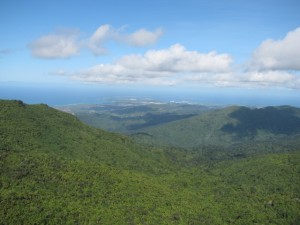Status of carbon management in Vermont and Puerto Rico
Forests play a critical role in climate change. As carbon sinks, forests capture carbon dioxide and store it as carbon, decreasing the amount of greenhouse gases in the atmosphere. In recent years forest carbon projects have become increasingly popular as tools to mitigate climate change under the voluntary carbon market and the Kyoto Protocol’s flexible mechanisms (clean development mechanism and joint implementation). This trend is growing with the current emphasis on including reduced emissions from deforestation and degradation (REDD) into post- Kyoto climate change programs. Forest carbon projects offer forest owners the potential to earn revenue for their carbon storage in compensation for foregone profits from other management options. Yet forest owners in Vermont and Puerto Rico are not yet taking advantage of this source of revenue.
In Vermont, 31% of family (private) forest owners with holdings between 10 and 999 acres have a management plan, 60% have harvested timber, and 7% hold a conservation easement (Sustaining Family Forests Initiatives, 2009). Family forest owners in Vermont are relatively knowledgeable about forest management. They know about the potential revenue from carbon management, but do not know how to integrate it into their current management. The ongoing debate about the future of woody biomass energy in the region creates further confusion for forest owners – should they manage their forest to retain carbon on site, or should they contribute woody biomass toward renewable energy sources? Can they do both?
Puerto Rico, in contrast, has had little forest management in the past 80 years. Private forest owners have little experience or knowledge of how to actively manage their land. While some natural resource professionals see potential for forest carbon projects, the majority of forest owners are not thinking about it. Any efforts to create payments for ecosystem services in Puerto Rico revolve around water, an important resource to this island. However, as urban development spreads into rural areas, maintaining forest cover through forest carbon projects could be important.
Sources: Sustaining Family Forests Initiative. (2009). Overview of woodland owners in Vermont. Retrieved from http://www.engaginglandowners.org/profile/state/vermont/overview/50?selection=Vermont.
– Amanda Egan, Rubenstein School of Environment and Natural Resources graduate student
Ecosystems services are probably the most notorious benefit of keeping a pristine forest. Water quantity and quality are positively influenced by forested land. An actively managed forest can improve both quantity and quality of the water if they are considered in the management activities and plan. – Veronica Sosa-Gonzalez, Rubenstein School of Environment and Natural Resources graduate student
Brochure El Centro_EnglishVersion
Brochure El Centro_SpanishVersion

Puerto Rico is over 55% forested and there is potential for payments for ecosystem services schemes to be developed on the island.